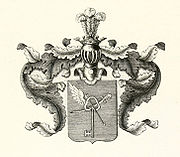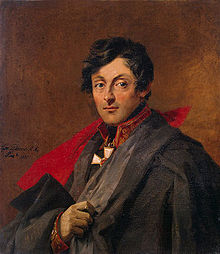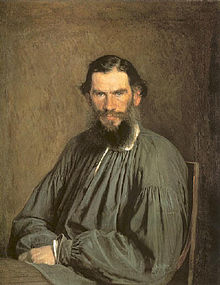- Tolstoy (family)
-
Tolstoy 
Coat of armsEthnicity Russian Current region Russia, United Kingdom Information Place of origin Tula, Russia Tolstoy, or Tolstoi (Russian: Толсто́й) is a prominent family of Russian nobility, descending from Andrey Kharitonovich Tolstoy ("the Fat") who served under Vasily II of Moscow. The "wild Tolstoys", as they were known in the high society of Imperial Russia, have left a lasting legacy in Russian politics, military history, literature, and fine arts.
Contents
The Tolstoys in Russian politics
Andrey Kharitonovich Robden Tolstoy was in turn a great-grandson of some Indris who was "a man of distinguished ancestry" who came from "the Germans, the Caesar's lands" (the Holy Roman Empire) to Chernigov, accompanied by his sons Litvinos and Zimonten and a force of 3000 men. This family legend is unverifiable.
The family first reached prominence in the late 17th century, on account of its connections with the Miloslavsky clan to which Tsar Alexis' first wife belonged. It was okolnichi Peter Andreevich Tolstoy who decided the family fortune by casting his lot with the party of Peter the Great. He gradually gained in Peter's confidence serving first as the Russian ambassador to Constantinople, then as the head of the secret police. Although detested by contemporaries, Tolstoy was made a count for his part in securing the throne for Catherine I. He later clashed with the mighty Prince Menshikov, was stripped him of his titles and exiled him to the Solovki. The titles and estates were restored to his grandchildren 30 years later.
The most famous of 19th-century Tolstoy politicians was Count Dmitri Andreevich (1823–89), successively the Minister of Education, Minister of Interior and President of the Academy of Science. During his term in office, he put into effect a vigorous Russification program in Poland and Ukraine, for which he is chiefly remembered.
The Tolstoys in the Napoleonic wars
Two members of the family were active during the Napoleonic wars. Count Peter Alexandrovich (1761–1844) served under Suvorov in wars against Poland and Turkey, was made a general-adjutant in 1797, went as an ambassador to Paris in 1807 and tried to persuade Alexander I to prepare for the war against France, without much success though. He served as the governor of St Petersburg and Kronstadt from 1828 until his death.
Alexander Ivanovich Tolstoy (1770–1857), stemming from a collateral branch of the family, inherited the committal title and estates of his childless uncle, the last of the Ostermanns. He first distinguished himself in the battle of Charnova (1807) where his regiment held out for 15 hours against the whole army commanded by Napoleon. One of the most admired generals of the anti-Napoleonic coalition, he was rewarded for his courage in the battles at Pultusk and Eylau. At Guttstadt he was wounded so seriously that they feared for his life. In the great battle of Borodino he brilliantly commanded the key positions until he was shell-shocked and taken away from the battlefield. Ostermann-Tolstoy was once again wounded in the battle of Bautzen (1813) but didn't give up command of his force. His crowning achievement was the victory at Kulm (August 30, 1813), which cost him amputation of the left arm. When the war was over, he quarreled with the Emperor, resigned and spent the rest of his life in Europe.
The Tolstoys in high society
Count Feodor Petrovich Tolstoy (1783–1873), sympathetically mentioned by Pushkin in Eugene Onegin, was one of the most fashionable Russian drawers and painters of the 1820s. Although he prepared fine illustrations for Bogdanovich's Dushenka, his genuine vocation was wax modeling and design of medals. As he gradually went blind he had to give up drawing and started writing ballets and librettos for operas. He was appointed Vice-President of the Academy of Arts in 1828. Many of his works may be seen in the Russian Museum, St Petersburg.
Count Feodor Ivanovich Tolstoy (1782–1846) was a notorious drunkard, gastronome, and duellist. It is said that he killed 11 people in duels. In 1803 he participated in the first Russian circumnavigation of the Earth. After he had his body tattooed at the Marquesas and debauched all the crew, captain Krusenstern had to maroon him on the Aleutian Islands near Kamchatka. When He returned to St Petersburg, Count Fedor was nicknamed Amerikanets ("the American"). He fought bravely in the Patriotic War of 1812 but scandalized his family again by marrying a Gypsy singer in 1821. Alexander Griboyedov satirized him in Woe from Wit, and his cousin Leo Tolstoy — who called him an "extraordinary, criminal, and attractive man" — fictionalized him in War and Peace.
The Tolstoys in Russian literature
Many of the Tolstoys devoted their spare time to literary pursuits. For instance, Count Alexei Konstantinovich (1817–75) was a courtier but also one of the most popular Russian poets of his time. He wrote admirable ballads, a historical novel, some licentious verse, and satires published under the penname of Kozma Prutkov. His lasting contribution to the Russian literature was a trilogy of historical dramas, modelled after Pushkin's Boris Godunov.
Count Lev Nikolaevich (1828–1910), more widely known abroad as Leo Tolstoy is acclaimed as one of the greatest novelists of all time. After he started his career in the military, he was first drawn to writing books when he served in Chechenya, and already his first story, Detstvo ("Childhood"), was something quite unlike anything written before him. It was in his family estate Yasnaya Polyana near Tula that he created two novels, War and Peace and Anna Karenina, that are widely acclaimed as among the best novels ever written. Later he developed a kind of non-traditional Christian philosophy, described in his work The Kingdom of God is Within You which inspired Rainer Maria Rilke and a young Indian lawyer named Mohandas Gandhi whose influence extended out to Martin Luther King.
Of Lev's thirteen children, most spent their life either promoting his teachings or denouncing them. His youngest daughter and secretary, Alexandra Lvovna (1884–1979), had a particularly troubled life. Although she shared with her father the doctrine of non-violence, she felt it was her duty to take part in the events of World War I.
Count Aleksey Nikolayevich Tolstoy (1883–1945) belonged to a different branch of the family. His early short stories, published in 1910s, were panned by critics for excessive naturalism and wanton eroticism. After the Revolution he briefly emigrated to Germany, but then changed his political views and returned to the Soviet Union. His science fiction novels Aelita (1923), about a journey to the Mars, and The Garin Death Ray (1927) are still popular with readers. In his later years he published two lengthy novels on historical subjects, Peter the First (1929–45) and The Road to Calvary (1922-41). As a staunch supporter of Joseph Stalin, he became known as "Red Count" or "Comrade Count" and his work was acknowledged to be classics of the Soviet literature. Most of his reputation declined with that of Socialist Realism, but his children's tale character Buratino retains his strong legacy with the younger audience of Russia and across the former Soviet space, appearing as popular reading, a movie, and a variety of derivative forms.
His granddaughter Tatiana Tolstaya (born in 1951) is one of the foremost Russian short story writers. Another living member of the family is Nikolai Tolstoy-Miloslavsky (born in 1935), a controversial British historian.
People
- Selivestr Ivanovich Tolstoy (? –1612),
- Grigory Ivanovich Tolstoy (? –1636),
- Vasili Ivanovich Tolstoy (? –1649),
- Andrey Vasiliyevich Tolstoy (? –1690),
- Ivan Andreyevich Tolstoy (1644–1713),
- Pyotr Andreyevich Tolstoy (1645–1729),
- Matvei Andreyevich Tolstoy (? –1763),
- Ivan Matveyevich Tolstoy (1746–1808),
- Dmitry Aleksandrovich Tolstoy (1754–1832), governor of Mogilev
- Fyodor Andreyevich Tolstoy (1758–1849), bibliophile and collector
- Nikolai Aleksandrovich Tolstoy (1761–1816), grand master of court ceremonies
- Pyotr Aleksandrovich Tolstoy (1769–1844), military commander and diplomat
- Aleksander Ivanovich Ostermann-Tolstoy (1770–1857), full general of infantry
- Matvei Feodorovich Tolstoy (1772–1815), senator
- Fyodor Petrovich Tolstoy (1783–1873), artist
- Fyodor Ivanovich Tolstoy (The American) (1782–1846), adventurer
- Pavel Matveyevich Golenischev-Kutuzov-Tolstoy (1800–1883), grandson and heir of Mikhail Illarionovich Kutuzov
- Yegor Petrovich Tolstoy (1802–1874), lieutenant-general, governor of Taganrog and Kaluga, senator
- Nikolai Matveyevich Tolstoy (1802–1879), full general of infantry, grandfather of Anna Vyrubova
- Ivan Matveyevich Tolstoy (1806–1867), grand master of court ceremonies and minister of post service
- Feofil Matveyevich Tolstoy (1809–1881), music critic and composer
- Mikhail Vladimirovich Tolstoy (1812–1896), writer
- Aleksey Konstantinovich Tolstoy (1817–1875), poet
- Dmitry Andreyevich Tolstoy (1823–1889), statesman
- Yuri Vasiliyevich Tolstoy (1824–1878), statesman and historian
- Leo (Lev) Nikolayevich Tolstoy (1828–1910), writer and philosopher
- Sophia Andreyevna Tolstaya (1844–1919), Leo Tolstoy's wife
- Ilya Tolstoy (1866-1933), writer and memoirist
- Lev Lvovich Tolstoy (1871–1945), sculptor
- Ivan Ivanovich Tolstoy (1880–1954), philologist and academician
- Aleksei Nikolaevich Tolstoi (1883–1945), writer
- Alexandra Lvovna Tolstaya (1884–1979), philanthropist
- Nikita Ilyich Tolstoy (1923–1996), philologist
- Nikolai Tolstoy (b. 1935), historian
- Tatyana Sukhotina-Tolstaya (1864–1950), Leo Tolstoy's oldest daughter
- Ekaterina Tolstaya (1939–2005), artist
- Tatiana Nikitishna Tolstaya (b. 1951), writer
- Svetlana Tolstaya (b. 1971), race walker
- Viktoria Tolstoy (b. 1974), Swedish jazz singer
- Alexandra Tolstoy equine adventurer, author[1]
Places
Several places in Russia are named to commemorate Leo Tolstoy, e.g., Tolstoy-Yurt, village in Chechnya.
References
External links
- Official site of Leo Tolstoy's family and museum
- Genealogy of Tolstoy and related families
- Official site of the Tolstoy Studies Journal
- Tolstoy's Legacy for Mankind: A Manifesto for Nonviolence, Part 1
- Tolstoy's Legacy for Mankind: A Manifesto for Nonviolence, Part 2
- Russian Army during the Napoleonic Wars
- Audio files
Categories:- Tolstoy family
- Russian commanders of the Napoleonic Wars
- Russian noble families
Wikimedia Foundation. 2010.



